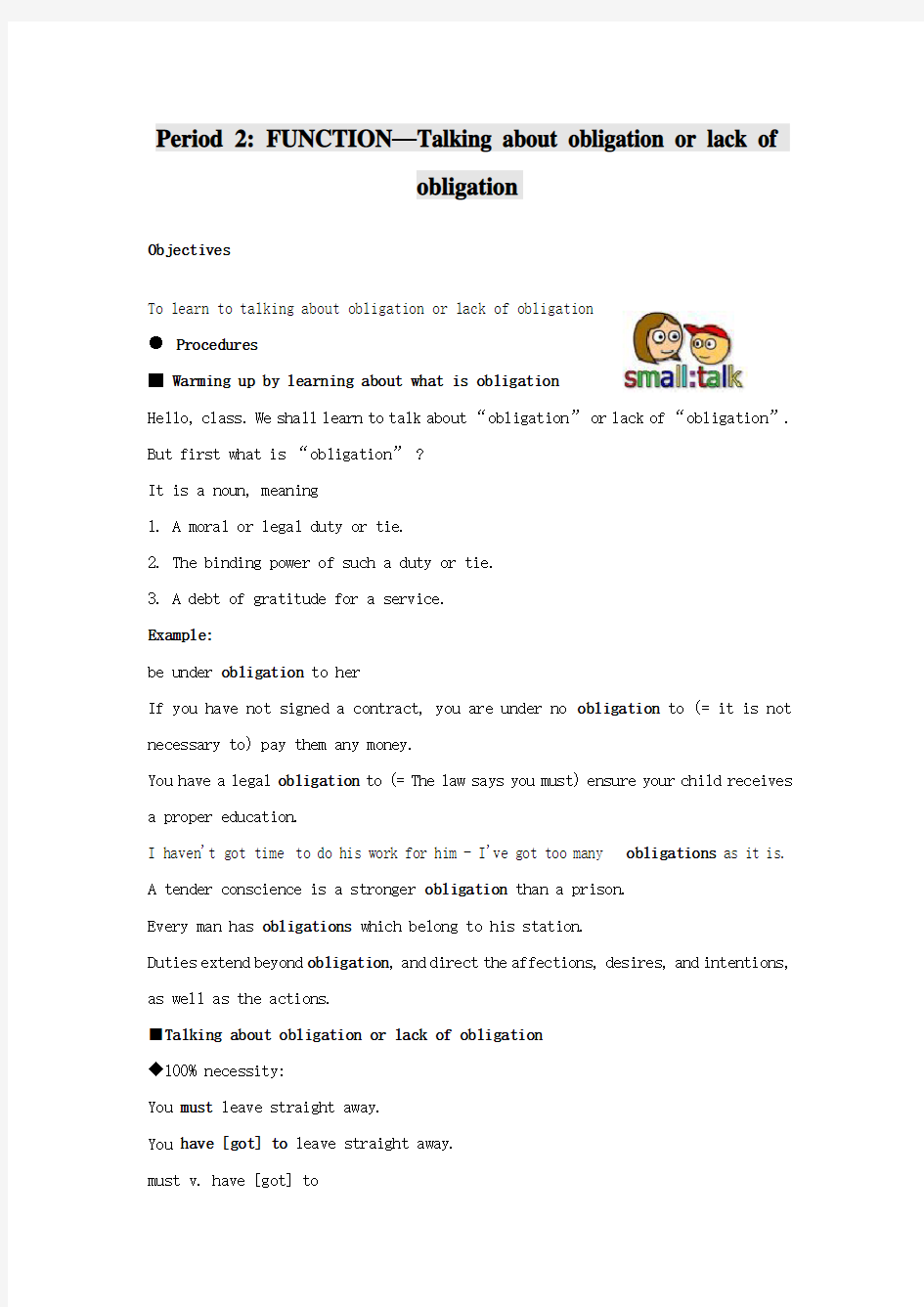

Period 2: FUNCTION—Talking about obligation or lack of
obligation
Objectives
To learn to talking about obligation or lack of obligation
●Procedures
▇ Warming up by learning about what is obligation
Hello, class. We shall learn to talk about “obligation” or lack of “obligation”. But first what is “obligation” ?
It is a noun, meaning
1. A moral or legal duty or tie.
2. The binding power of such a duty or tie.
3. A debt of gratitude for a service.
Example:
be under obligation to her
If you have not signed a contract, you are under no obligation to (= it is not necessary to) pay them any money.
You have a legal obligation to (= The law says you must) ensure your child receives a proper education.
I haven't got time to do his work for him - I've got too many obligations as it is.
A tender conscience is a stronger obligation than a prison.
Every man has obligations which belong to his station.
Duties extend beyond obligation, and direct the affections, desires, and intentions, as well as the actions.
■Ta lking about obligation or lack of obligation
◆100% necessity:
You must leave straight away.
You have [got] to leave straight away.
must v. have [got] to
Generally, must shows what the speaker feels and it is the speaker's authority; have [got] to is when the speaker uses an external force which they cannot control: doctor to patient: You've got to stop smoking.
patient to themself: I must stop smoking.
◆0% necessity:
We don't have to pay to get in.
We have not got to see the boss after all.
We needn't stay late.
These have an element of being optional, i.e. we needn't stay late but we can if we want to.
◆obligation:
You ought to call your mother.
You should call your mother.
These show that calling your mother is the right thing to do. There is no real difference between ought to and should, but ought to is perhaps a little stronger. We use needn't to show an action is optional - I can do it if I want to. We use mustn't to say an action is forbidden - I have no choice.
■Making a dialogue talking about obl igation or lack of obligation
A: I have to work all day long tomorrow.
B: You mustn't work all the time. You will ruin your health.
A: Must I return the book tomorrow?
B: Yes, you have to.
A: He had to go because of somebody's calling him that day.
B: I don’t think so. He could call back.
A: I have lots of work to do. I don’t like to work on Sundays.
B: You must do it now.
A: I have to go now.
B: But you must stay till he comes.
A: Need I attend the meeting tomorrow?
B: No, you needn’t. You could read my notes taken at the meeting then.
A: Must I hand in the paper this week?
B: No, you needn’t. You need not hand in the paper this week.
A: You ought to read these books if you want to know how to repair the motorcar. B: But I have no time to read them.
A: You ought to bring the child here.
B: All right. I will.
A: You ought to have been here yesterday.
B: But there have been much traffic.
A: You ought not to have taken the book out of the reading-room.
B: I did not know about the rules here.
A: I have to go now.
B: But you have to cook for my child.
A: You must be here on time next time.
B: Certainly. But we must go to get the timetable ourselves.
附:教案格式模板
所在单位
所属教研室
课程名称
授课教师
《******》教案(宋体二号,标题加粗)
一、课程性质:(注:填公共基础必修课、公共基础选修课、专业基础必修课、专业核心必修课、师范技能必修课、师范技能选修课)
二、总学时∕学分:
三、课程类型:理论课()实践(含实验)课()
四、学时分配:理论课()学时实践(含实验)课()学时
五、授课专业、层次:
六、本课程的教学目的和要求:
七、本课程的教学重点、难点:
八、教材和参考书:
《******》教案内容(宋体二号,标题加粗)
一、章节内容:(正文:宋体五号,标题加粗,18磅)
二、课时:
三、教学目的:
四、教学重点与难点:
五、教学方法:
六、教学过程设计:
小结:
七、作业布置:
八、教具:
想要了解更多,请访问我的豆丁主页:https://www.doczj.com/doc/279107690.html,/2363291614
(注:可编辑下载,若有不当之处,请指正,谢谢!)